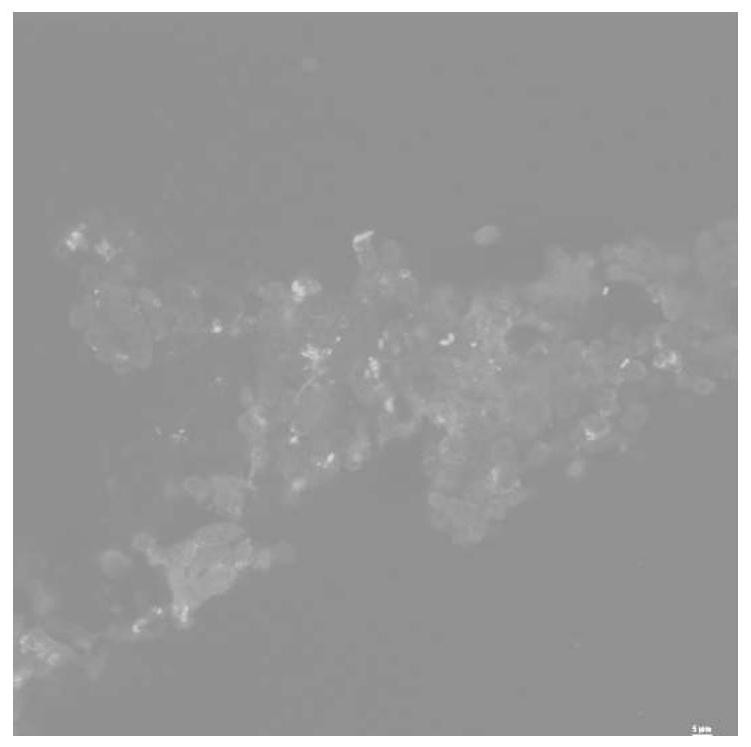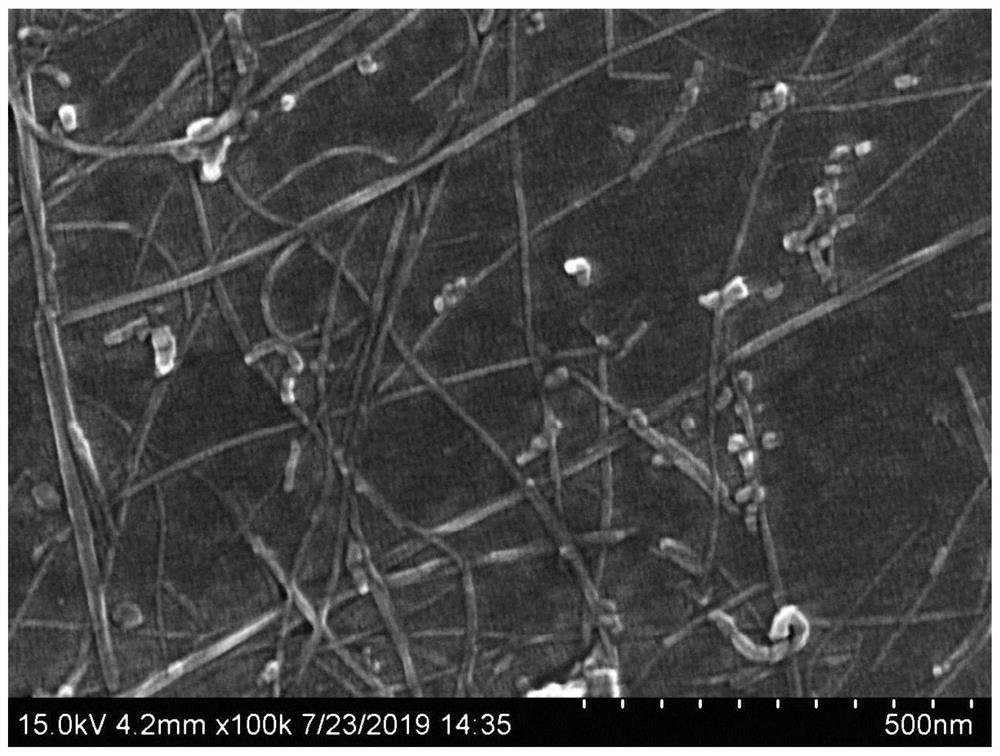Use of a material based on carbon nanotubes and phycoerythrin
A technology of phycoerythrin and carbon nanotubes, which can be applied to wave energy or particle radiation treatment materials, medical preparations with non-active ingredients, medical preparations containing active ingredients, etc. The blue protein structure is not very stable and other problems, to achieve the effect of improving stability, good stability, and improving light conversion efficiency
- Summary
- Abstract
- Description
- Claims
- Application Information
AI Technical Summary
Problems solved by technology
Method used
Image
Examples
Embodiment 1
[0031] Embodiment 1 A method for preparing a material based on carbon nanotube-coupled phycoerythrin, comprising the following steps:
[0032] (1) Prepare a carboxylated single-walled carbon nanotube dispersion with a concentration of 1 mg / mL with deionized water, take 1 mL of the carboxylated single-walled carbon nanotube dispersion, dilute it 50 times, take 10 mL, and ultrasonicate for 90 minutes;
[0033] (2) Add 0.2 mL of 9 mg / mL 1-(3-dimethylaminopropyl)-3-ethylcarbodiimide (EDC) solution and 0.2 mL of 5 mg / mL dissolved in PBS buffer to the above dispersion mL of N-hydroxysulfosuccinimide (NHS) solution dissolved in PBS buffer (with the addition of EDC and specific weight ratios of NHS to carboxylated SWNTs of 9:1 and 5:1), ultrasonically dispersed 30min and placed at room temperature (25°C) under magnetic stirring for 18h; the PBS buffer is 50mM sodium phosphate buffer with a pH of 7.0;
[0034] (3) Then add 4 mg of phycoerythrin to the above reaction solution, the spec...
Embodiment 2
[0036] Embodiment 2 A method for preparing a material based on carbon nanotube-coupled phycoerythrin, comprising the following steps:
[0037] (1) Prepare a carboxylated single-walled carbon nanotube dispersion with a concentration of 1 mg / mL with deionized water, take 1 mL of the carboxylated single-walled carbon nanotube dispersion, dilute it 20 times, take 10 mL, and ultrasonicate for 90 minutes;
[0038] (2) Add 0.5mL 9mg / mL 1-(3-dimethylaminopropyl)-3-ethylcarbodiimide (EDC) solution and 0.5mL 5mg / mL dispersed in PBS buffer to the above dispersion mL of N-hydroxysulfosuccinimide (NHS) solution dispersed in PBS buffer (the specific weight ratios of EDC and NHS to single-walled carbon nanotubes were 9:1 and 5:1), ultrasonically dispersed for 30 min and Stir magnetically at room temperature (25° C.) for 18 hours; the PBS buffer is 50 mM sodium phosphate buffer with a pH of 7.0;
[0039] (3) Then add 10 mg of phycoerythrin to the above reaction solution, the specific amount ...
Embodiment 3
[0041] Embodiment 3 A method for preparing a material based on carbon nanotube-coupled phycoerythrin, comprising the following steps:
[0042] (1) Prepare a carboxylated single-walled carbon nanotube dispersion with a concentration of 1mg / mL with deionized water, take 1mL of the carboxylated single-walled carbon nanotube dispersion, dilute it 10 times, take 10mL, and first sonicate for 90min;
[0043] (2) Add 1mL 9mg / mL 1-(3-dimethylaminopropyl)-3-ethylcarbodiimide (EDC) solution and 1mL 9mg / mL dissolved in PBS buffer to the above dispersion N-hydroxysulfosuccinimide (NHS) solution in PBS buffer (the specific weight ratios of EDC and NHS to single-walled carbon nanotubes are 9:1 and 5:1), ultrasonically dispersed for 30min and placed in Magnetic stirring at room temperature (25° C.) for 18 h; the PBS buffer is 50 mM sodium phosphate buffer with a pH of 7.0;
[0044] (3) Then add 15 mg of phycoerythrin to the above reaction solution, the specific amount of addition is 15 mg of p...
PUM
| Property | Measurement | Unit |
|---|---|---|
| diameter | aaaaa | aaaaa |
| diameter | aaaaa | aaaaa |
Abstract
Description
Claims
Application Information
 Login to View More
Login to View More - R&D
- Intellectual Property
- Life Sciences
- Materials
- Tech Scout
- Unparalleled Data Quality
- Higher Quality Content
- 60% Fewer Hallucinations
Browse by: Latest US Patents, China's latest patents, Technical Efficacy Thesaurus, Application Domain, Technology Topic, Popular Technical Reports.
© 2025 PatSnap. All rights reserved.Legal|Privacy policy|Modern Slavery Act Transparency Statement|Sitemap|About US| Contact US: help@patsnap.com



